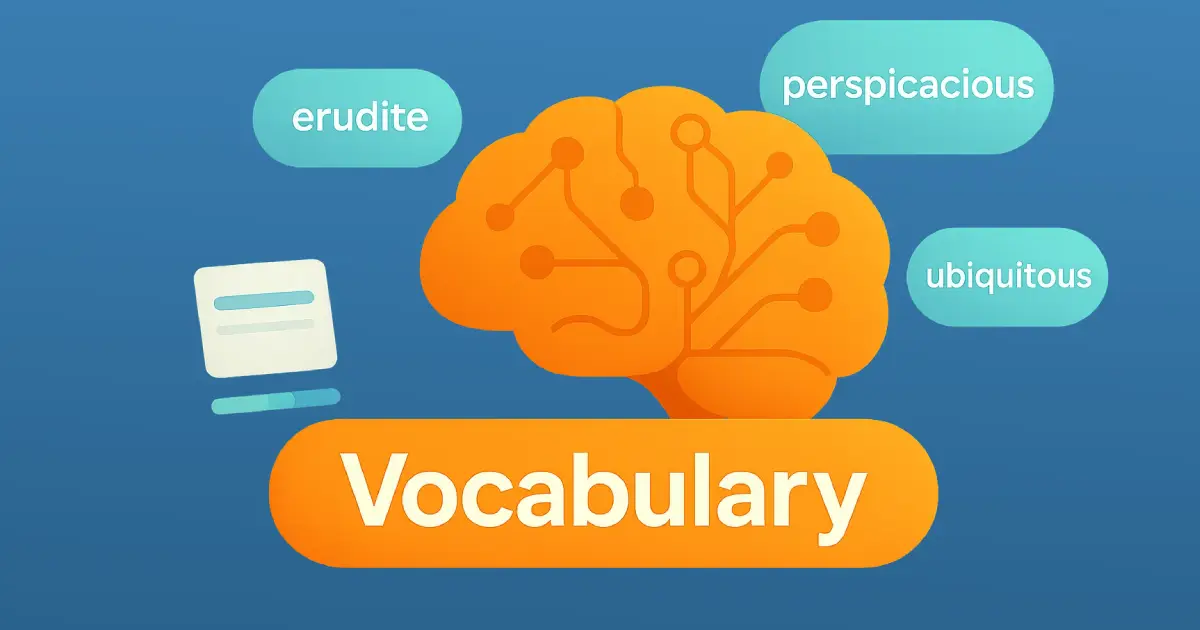Building a strong GRE vocabulary doesn't have to be overwhelming. With the right approach and AI-powered tools, you can master thousands of words efficiently and retain them long-term.
The Science Behind Spaced Repetition
Spaced repetition is a learning technique that involves reviewing information at increasing intervals. Research shows this method can improve retention by up to 200% compared to traditional cramming methods.
Why Traditional Vocabulary Lists Fail
Most students make the mistake of trying to memorize word lists through repetition alone. This approach fails because:
- No context: Words are learned in isolation
- No feedback: You don't know if you truly understand the word
- No personalization: Everyone gets the same list regardless of their level
- No retention strategy: Once you move on, you forget previous words
The AI-Powered Snap Method
AI-powered Snaps revolutionize vocabulary learning by combining:
1. Contextual Learning
Each word is presented with multiple example sentences from real GRE passages, helping you understand nuanced usage.
2. Adaptive Difficulty
The AI analyzes your performance and adjusts the difficulty level, focusing more time on words you find challenging.
3. Instant Feedback
Get immediate explanations for why certain answer choices are correct or incorrect, reinforcing proper understanding.
4. Spaced Repetition Algorithm
Words you struggle with appear more frequently, while mastered words are reviewed at optimal intervals to maintain retention.
Your 15-Minute Daily Routine
Here's how to structure your daily vocabulary practice:
Minutes 1-5: New Words
- Learn 5-7 new high-frequency GRE words
- Read definitions and example sentences
- Create mental associations or mnemonics
Minutes 6-10: Review Session
- Practice with words from previous days
- Focus on words you've marked as difficult
- Use the AI feedback to understand mistakes
Minutes 11-15: Quick Quiz
- Take a 5-question quiz mixing new and review words
- Analyze your performance patterns
- Adjust your study plan based on results
Advanced Strategies for Vocabulary Mastery
Word Families and Roots
Group related words together to accelerate learning:
- Bene- (good): benevolent, beneficial, benign
- Mal- (bad): malevolent, malicious, malady
- -ous (full of): verbose, porous, arduous
Context Clues Practice
Train yourself to infer word meanings from context:
- Read the sentence without the target word
- Predict what type of word fits
- Check if your prediction matches the actual meaning
- Practice with increasingly difficult passages
Memory Techniques
- Visual associations: Link abstract words to concrete images
- Personal connections: Relate words to your own experiences
- Storytelling: Create narratives that include multiple vocabulary words
Tracking Your Progress
Monitor these key metrics:
- Daily streak: Consistency is more important than intensity
- Accuracy rate: Aim for 80%+ on review sessions
- Retention rate: How well you remember words after 1 week
- Speed improvement: Time to recall word meanings
Common Mistakes to Avoid
1. Studying Too Many Words at Once
Quality over quantity. It's better to truly master 10 words than to superficially learn 50.
2. Ignoring Word Forms
Learn all forms of a word: noun, verb, adjective, adverb variations.
3. Skipping Review Sessions
New learning is exciting, but review is where retention happens.
4. Not Using Words in Context
Practice using new vocabulary in your own sentences and writing.
The 30-Day Challenge
Commit to this routine for 30 days:
- Week 1: Focus on high-frequency words (150-200 words)
- Week 2: Add medium-frequency words while reviewing Week 1
- Week 3: Introduce challenging words and practice mixed quizzes
- Week 4: Intensive review and practice test simulation
Frequently Asked Questions
How many words should I learn per day?
Start with 5-7 new words daily. Focus on quality retention rather than quantity. As you build confidence, you can gradually increase to 10-12 words per day.
What if I forget words I learned last week?
This is normal and expected. The spaced repetition algorithm will bring these words back for review. Each time you re-learn a word, the retention becomes stronger.
Conclusion
Mastering GRE vocabulary with AI-powered Snaps isn't just about memorization—it's about building a systematic, scientific approach to word learning. The combination of spaced repetition, contextual learning, and AI feedback creates an optimal environment for long-term retention.
Remember: consistency beats intensity. Fifteen focused minutes daily will yield better results than cramming for hours once a week.
Start your vocabulary journey today and watch your GRE Verbal score improve steadily over time.
